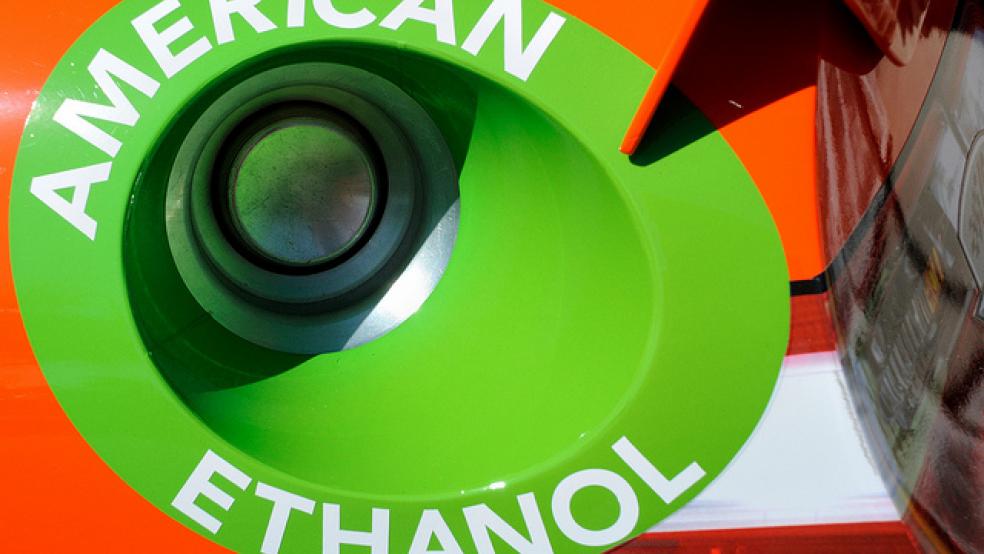There was a time when speaking out against federal ethanol subsidies – especially for presidential candidates – was considered political suicide. Ethanol, made from corn, is produced by Midwestern states like Iowa and converted into a biofuel.
Indeed, every Republican who has won the Iowa caucuses dating back to the 1980s has pledged allegiance to ethanol, including former Sen. Bob Dole of Kansas, who was dubbed “Senator Ethanol” during his 1996 campaign.
Related: Republican Ted Cruz Vaults Into First Place in New Iowa Poll
But Sen. Ted Cruz of Texas, the current frontrunner in the Iowa GOP contest, appears determined to break that mold. Cruz has boldly advocated an end to the Renewable Fuel Standard (RFS), the so-called federal ethanol mandate that requires refiners to blend an increasing amount of biofuels with the gasoline supply.
As James Hohmann of The Washington Post wrote on Tuesday, the freshman Texas senator has been unabashedly critical of federal support for ethanol, including RFS, which he considers market-distorting corporate welfare.
During a March Iowa Agriculture Summit that drew many of the GOP presidential hopefuls, Cruz stood out from the others in his unwavering opposition to RFS, declaring, “People are pretty fed up with politicians that run around and tell one group one thing and tell another group another thing.”
Cruz sponsored a Senate bill to gradually repeal RFS standards over five years. He didn’t try to sugar coat his proposal at the Iowa agriculture event, saying that he’s against corporate welfare of all kinds.
Related: Why Ted Cruz Is Surging in the Polls
With solid support from evangelical Christians, Tea Party supporters and even some establishment Republicans, Cruz holds a commanding lead among Republicans likely to attend the February 1 caucuses with 31 percent, according to a December 14 Des Moines Register/Bloomberg poll.
Donald Trump is Cruz’s nearest rival in Iowa, with 21 percent of the likely caucus goers, followed by Ben Carson with 13 percent and Sen. Marco Rubio of Florida with 10 percent.
Despite his 10-point lead over Trump, Cruz is taking a calculated risk in denouncing the long-standing government support of corn-based ethanol in a state where GOP voters overwhelming favor the subsidy.
For one thing, the powerful, well-funded ethanol industry is mounting a sophisticated campaign to make RFS a top issue heading into the caucuses. According to The Post, Eric Branstad, the son of the popular Republican governor Terry Branstad, is leading the campaign dubbed “America’s Renewable Future.” With 17 field staffers and a radio ad and direct mail strategy, the group already has collected pledges from more than 50,000 people to make the issue a priority at the caucuses.
Related: Trump Takes His Biggest Lead Yet in the Polls
Cruz is also under attack by a separate TV ad campaign, the “Iowa Progress Project,” which is spending $200,000 to highlight his opposition to RFS.
Meanwhile, Trump has cozied up to the ethanol industry and its supporters and has accused the Texan Cruz of opposing ethanol because he is in the pocket of major oil companies. “I say to myself: If Ted Cruz is against ethanol, how does he win in Iowa?” Trump said during a rally in Des Moines two weeks ago. “Because that’s very anti-Iowa.”
The recent Des Moines Register/Bloomberg poll found that 61 percent of likely Republican caucus-goers support the RFS, while just 34 percent oppose it. So why is Cruz continuing to do so well in Iowa?
According to Hohmann, the answer is that presidential elections are “increasingly nationalized and turn less on parochial issues.” That means, for example, that what voters see and hear on conservative cable TV news programs or national talk radio may have far greater influence than what the Farm Bureau or ethanol industry have to say.
Related: Ethanol Fraud and Why You Pay More at the Pump
The ethanol support system dates back to 1978, when Congress first approved a 40-cents-per-gallon subsidy for ethanol producers to prop up the industry. That costly subsidy subsequently was replaced by the Renewable Fuel Standard in 2005, which requires retailers to blend about 13 billion gallons of ethanol a year into the gasoline they sell to the public.
The standard was conceived to help reduce carbon emissions as well as U.S. dependence on foreign oil, although some experts and critics question how much it has helped on either score.
“Some say corn ethanol, the fuel most commonly blended with gasoline under the standard, actually worsens pollution,” The Wall Street Journal reported last month. “Others say the domestic oil boom has done far more to wean the nation off foreign oil.”





